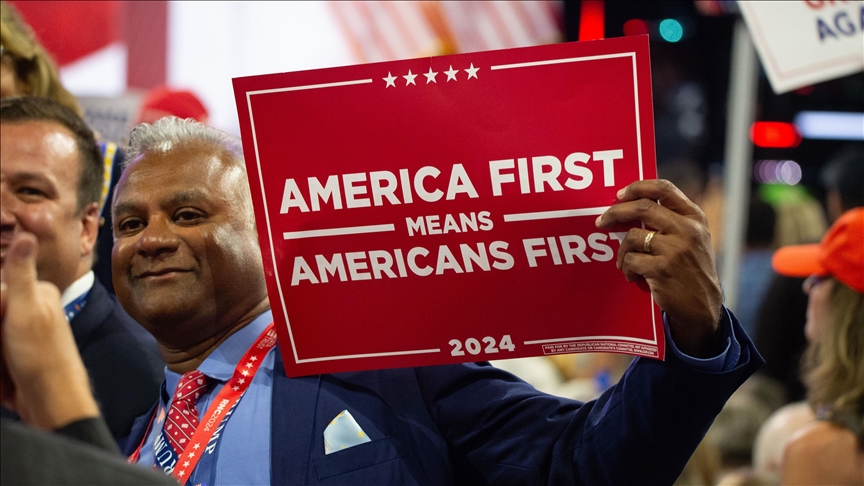OPINION - America First means everyone else is last
The dynamics of Trump's second term will force Europe to recalibrate its strategy towards the US. A new focus on autonomous energy, including nuclear, is increasingly resonating across most political parties and countries

- The author is the director of the European Neighbourhood Council (ENC).
- In an increasingly chaotic environment with America in retreat, Europe is rethinking its enlargement strategy and regional partnerships to ensure improved security, supply chain, and energy cooperation
ISTANBUL
Newly elected US President Donald Trump spells uncertainty for Europe. Across Europe’s right-wing, many parties applaud Trump’s "anti-woke" stance, business-friendly attitude, and strict migration policies. On the left-wing, most parties criticize President Trump’s threats of tariffs, fear of China, and anti-Palestinian policies. Many wonder if the new US administration will support Ukraine and NATO, especially as American fossil fuel exports remain expensive, unhealthy, and unsustainable. Both sides of the European political spectrum, however, agree on one point: America First means “everyone else is last.”
Italian Prime Minister Giorgia Meloni and Elon Musk might be friends, but that won’t change the fact that tariffs imposed by Trump on Europe will damage Italian companies and jobs. Tariffs will not stop migratory pressure in the Mediterranean, which is largely a consequence of unregulated access to the internet combined with “US endless wars.” Other leaders on the European right are equally unconvinced: “Trump is going to put his own interests first and there will be inconveniences for the EU and France. We remain tempered in our enthusiasm,” said a skeptical Marine Le Pen, the leader of France’s far-right National Rally (RN) group in the French assembly, after Donald Trump won the US presidential election back in November.
Trump has also promised to "end all wars," a promise welcomed by many in Europe. But an isolationist America does not necessarily mean a peaceful world. Trump’s personal relations with Netanyahu will favor continued Palestinian displacement and war by proxy. In Ukraine, many questions remain unanswered, but it is certain that for Europeans in the East, North, Baltic and Caucasus, the centuries-long threat of Russia will not magically disappear because of Trump's hyperbolic promises. What we can expect is an "America First" world, where Washington disengages and stops paying any bills, while allowing for more regional arms races, competition and proxy conflicts. Such instability always benefits a geographically isolated -but disproportionately dominant- America. Simply put, Washington will tell others around the world, including Europe, to spend more on defense, but always buy American. Washington will urge its partners to stop mining in China and to import the expensive American East Coast gas. Furthermore, it may halt regulations on the US digital space, giving tech billionaires free rein.
Trump's anti-China policy
A similar approach is expected for everyone, albeit with varying levels of reward. Trump will favor anyone who’s anti-China, including India, Israel, Japan, South Korea, Australia, and New Zealand. Egypt and Saudi Arabia will likely play an important role in Washington due to Trump’s pro-fossil-fuel policies, personal business relations and his son-in-law’s role in advancing the Abraham Accords. Without speculating too much, it is safe to say Saudi Arabia could soon benefit from nuclear and defense technology, as well as heightened security and intelligence coordination.
Across Eurasia, the US will try to destabilize strategic gas-for-defense relations between Beijing and Moscow. The first step includes a tentative meeting between Trump and Putin in early 2025. Whether such initiatives will prove successful remains difficult to predict. For Europe, however, being anti-China is harder than it is for Washington. A country like Türkiye is geographically positioned as a key hub for transit trade with Asia, while Germany and Poland are deeply intertwined in Beijing’s supply chains.
After the costly Ukraine war, in which German industry has suffered from heightened energy prices, it is natural that neither Berlin nor Warsaw welcomes Trump’s hawkish China policies. There are risks for Türkiye as well. Peace between Russia and Ukraine would stabilize the region, but also increase the chances of a revived Moscow.
New focuses for Europe
The dynamics of Trump's second term will force Europe to recalibrate its strategy towards the US. A new focus on autonomous energy, including nuclear, is increasingly resonating across most political parties and countries. In order to navigate these new challenges in trade, security, and global leadership, the deepening of integration, especially across domains like intra-military cooperation, is inevitably speeding up. The recent appointment of a European defense commissioner in charge of Europe’s military-industrial policy is a clear sign of the direction that Europe is taking. The Weimar Triangle Alliance between Germany, France, and Poland further underlines the importance of Europe developing autonomous defense, industrial, and energy policies.
Strengthening ties between Türkiye, the Euro-Mediterranean region, and Eastern allies in the Caucasus and Central Asia will be equally important for the European Union. In an increasingly chaotic environment with America in retreat, Europe is rethinking its enlargement strategy and regional partnerships to ensure improved security, supply chain, and energy cooperation.
As the saying goes: “If your neighbor’s house is on fire, you'd better help, unless you want your roof to burn as well.”
*Opinions expressed in this article are the author’s own and do not necessarily reflect Anadolu's editorial policy.
Anadolu Agency website contains only a portion of the news stories offered to subscribers in the AA News Broadcasting System (HAS), and in summarized form. Please contact us for subscription options.







